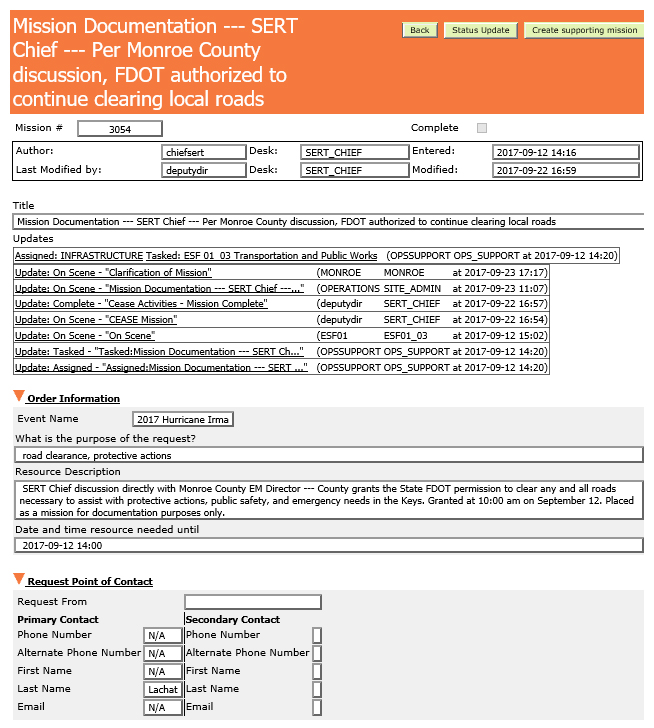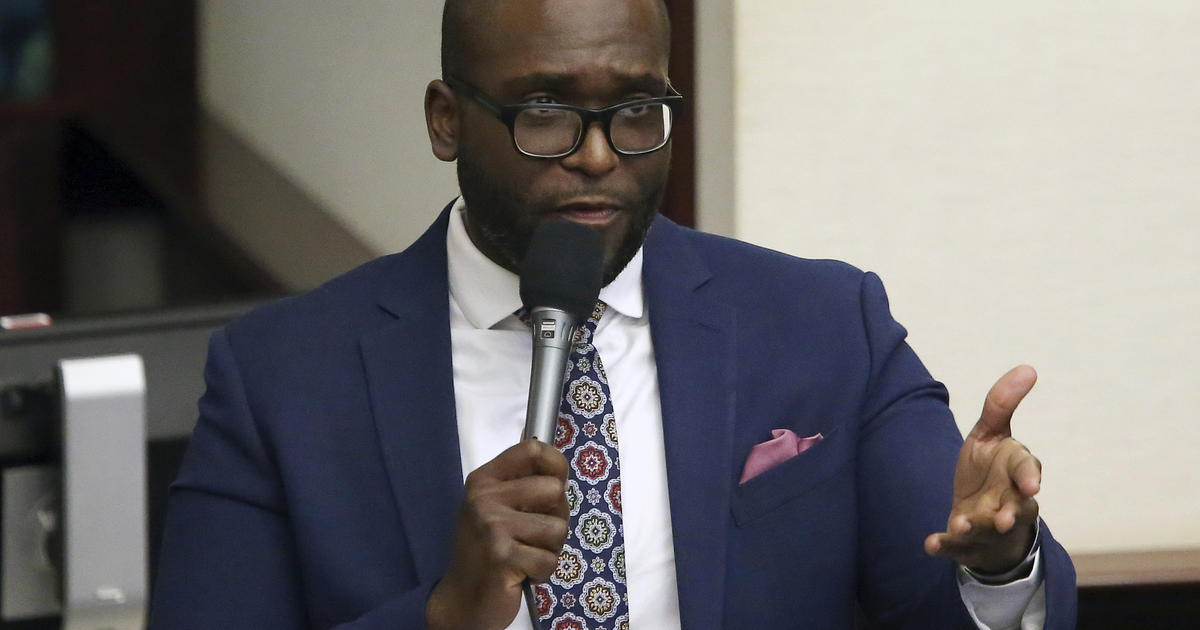Governor On Costly Debris Contracts: 'I Would Do The Same Thing Again'
Follow CBSMIAMI.COM: Facebook | Twitter
MIAMI (CBSMiami) – In a sworn deposition, the emergency manager for Monroe County denied requesting help from the state to remove storm debris immediately after Hurricane Irma, sharply undercutting the reason Governor Rick Scott and his staff have given for why they needed an emergency contract that needlessly cost taxpayers millions of dollars.
"I did not make a request," said the emergency manager, Martin Senterfitt, in a deposition obtained by CBS4 News.
Senterfitt's statement is the latest problem for the Governor and his staff as they have struggled for nine months to come up with an explanation as to why the state ignored the companies willing to clean up after the storm for far less money. (Wednesday evening, the Governor's office issued a "Setting The Record Straight" email with the headline "CBS-Miami Gets it Wrong on Debris Removal, Omits Context and Facts.")
A CBS4 News analysis examining the emergency contract prices charged by Munilla Construction Management (MCM) and Community Asphalt revealed the state would have saved $28 million to $30 million if they had used the companies already under contract with the state.
Critics said it made no sense for the state to ignore their pre-existing storm contracts in favor of the more expensive emergency contracts. Scott Amey, with the Project on Government Oversight, a non-partisan watchdog group that has been around since 1981, described it as "a rookie mistake."
"I thought most of these lessons were learned after previous hurricanes and what we went through with Hurricane Katrina so I'm actually shocked to hear that we are making the same mistakes that we made ten, fifteen years ago," he said.
Despite the criticism, the Governor was unwilling to admit he made any mistakes, saying Wednesday: "I would do the same thing again."
The Governor and his staff have repeatedly made various claims in defending the emergency contracts:
1. Monroe County requested the help
2. Comparing the pre-existing contracts with the emergency contracts is wrong and it "is comparing apples and oranges."
3. The pre-existing contracts weren't appropriate because they "are not strictly focused on debris removal."
4. Setting The Record Straight
A closer examination of those defenses, however, reveal they are either misleading or patently false.
MONROE REQUESTED ASSISTANCE
For months, the Governor's staff and the Florida Department of Transportation, which issued the emergency contracts, said they did so "following a request for assistance from Monroe County."
On Tuesday, the Governor's press office issued a statement saying: "We want to be clear: emergency crews were brought in to supplement ongoing work because the local government requested FDOTs assistance." And even as late as Wednesday evening, they continued to say the state was only responding to Monroe County's request.
The Governor's staff identified Senterfitt, Monroe's emergency manager, as the person making the request.
"I did not make a request," Senterfitt said under oath in April, as part of lawsuit between debris contractor AshBritt and Monroe County.
Senterfitt said on the morning of September 12, two days after the storm hit, he was speaking to his counterpart in Tallahassee, Leo Lachat, the deputy director for state's division of emergency management. He said it was Lachat who told him the state had finished clearing US1 in the Keys and offered to have their crews assist the county clearing some of the side streets.
"He stated he had resources available and asked if we would like those resources to help and I said yes," Senterfitt testified.
Asked if he expected FDOT to issue emergency contracts, Senterfitt said: "I did not."
Senterfitt said he had no idea the state issued those emergency contracts until well after they were signed. He said he never intended – nor did he want – the state to take over debris removal in the Keys. Monroe County had its own contracts for debris removal and they wanted to maintain control over the process.
By the time he learned of the emergency contracts on September 22nd, he contacted Lachat's boss, Bryan Koon, who at the time was the state's emergency management director.
"I asked him what happened," Senterfitt recalled. "And he said, `Well, DOT was involved with debris collection.' And I asked him why. And he said, `Well, that's what happened.' And that was the conversation. He would not go into detail."
Lachat declined to comment. A spokesman for the Division of Emergency Management also declined to comment.
Roman Gastesi, the Monroe County Administrator, confirmed the county never requested the state come in and take over debris removal. He said the county objected but the state refused to cancel the contracts.
"I realized if DOT is going to come in and play the hero, then okay let them come in and play the hero," Gastesi told CBS4 News last year. "Who those trucks belong to and who is driving them, I really don't care."
As part of its defense, state officials have repeatedly cited a screenshot (see below) of a computer system used by emergency managers around the state, called EM Constellation. However, if you actually read what is written in the September 12 screenshot, it includes nothing about debris removal. Instead, it discusses clearing roads.
Which means, rather than supporting the need for an emergency contract, the screenshot the governor's office continues to cite confirms Senterfitt's account that the only thing being discussed was clearing roads.
"APPLES AND ORANGES"
A spokeswoman for Governor Scott issued the following statement Tuesday to CBS4 News: "It is inaccurate to compare pre-disaster contracts with emergency debris removal contracts – it is comparing apples to oranges and must be reflected in your story."
The statement issued by the Governor's office, however, contradicts statements Scott made days after the storm, instructing cities and counties to use their pre-storm contracts to avoid "being price gouged by debris removal contractors."
"We will not tolerate any attempt by businesses to take advantage of our communities during their time of need," Scott said during a September 22 press conference, "especially in the wake of a natural disaster like Hurricane Irma."
In addition, the longstanding policy of the Federal Emergency Management Agency is that cities, counties and states have pre-existing debris removal contracts so that taxpayers can be protected.
The high prices paid under the emergency contract to MCM and Community Asphalt actually complicated debris removal efforts.
Ron Bergeron, the head of Bergeron Emergency Services, one of the companies that had pre-existing contracts with the state and local governments, said the emergency contract in the Keys actually slowed down debris removal for the rest of the state. Crews that would have worked for Bergeron and other firms in other parts of South Florida, left him to work for MCM and Community Asphalt because they could get paid more money.
"Absolutely," Bergeron answered when asked if the emergency contracts complicated debris removal elsewhere. "Well there is no question about that. You certainly can't make everybody live up to the contract they signed which I think they should and then turn around and have prices that are six, ten times higher
"NOT STRICTLY FOCUSED ON DEBRIS REMOVAL"
In a statement to CBS4 News last year, FDOT claimed: "The pre-event contracts that FDOT has in place include a variety of services and are not strictly focused on debris removal."
In fact, they are. The pre-existing, or pre-event, contracts are entirely focused on debris removal.
For instance, there are 32 separate line items in the emergency contract, including "Loading and Hauling Vegetative Debris,' "Loading and Hauling Construction and Demolition Debris," "Sweeping Curbs and Gutters," "Debris Management Site Fee," "Reduction of Vegetative Debris," "Hazardous Stump Removal," "White Goods Hauling," "Hazardous Tree Removal."
And every line item in the emergency contract is also in the pre-existing contracts the Governor ignored. There isn't a category covered in the emergency contract that isn't also covered in the pre-existing contract.
"SETTING THE RECORD STRAIGHT"
Often when the Governor's office dislikes a story critical of the Administration, it issues a "Setting The Record Straight" press release.
On Wednesday evening, the Governor's staff issued one entitled: "Setting The Record Straight: CBS-Miami Gets It Wrong on Debris Removal, Omits Context and Facts."
Ironically, it continues to maintain the state only responded because of a request from Monroe County.
It also stresses an appearance by Senterfitt before a Legislative committee on October 12 in which he praised the work done by FDOT.
"The amount of debris we're facing, some estimates over 2 million cubic yards of debris," he said. "It's piled on the streets, it looks like the Florida Keys now has mountains. The debris issue is tremendous, but we're working it. Fortunately, great partnerships, FDOT stepped forward, has really taken a leadership role and has helped us solve these problems."
The question, however, wasn't whether or not MCM or Community Asphalt did the work they were assigned by the state. The question has always remained the cost to taxpayers and why the state didn't use the firms already under contract.
The Governor is quoted in the Setting The Record Straight press release saying: "Let's not forget, the Florida Keys, a chain of islands with only one way in and one way out, took a direct hit by a Category 4 hurricane."
"It's easy for these vendors to look back and say they would have shown up and completed the work for cheaper, but in the days following the storm, they were clearly overleveraged and did not have the people or equipment to fulfill their commitments," he continued. "I will never let special interests get in the way of storm recovery. We sent additional resources to get the job done for a community that needed help and given a choice, I would do the same thing again."
The problem with the Governor's statement is that while he claims the companies with pre-existing contracts were not able to "fulfill their commitments," he offers no proof. And none of the companies said they were asked on September 12 if they could do the work.
"We took swift and appropriate action to get debris removed quickly so the more than 80 percent of Keys residents who evacuated could return home," Scott stated in the press release. "We had multiple vendors, lobbyists and legislators advocating for the state to let the federal government manage debris removal. The federal government would have contracted with the same companies, but it would have been more expensive for taxpayers. By holding the line and utilizing FDOT contractors, National Guardsman and internal FDOT crews, we made vendors trying to profit from this disaster angry. As Governor it is my job to help communities when they need it, and that is exactly what we did here."
The curious part of the Governor's statement is that he claimed to save taxpayers money. It is not clear why he believes the emergency contracts awarded to MCM and Community Asphalt saved taxpayers money, since their rates were arguably the highest in the state.




